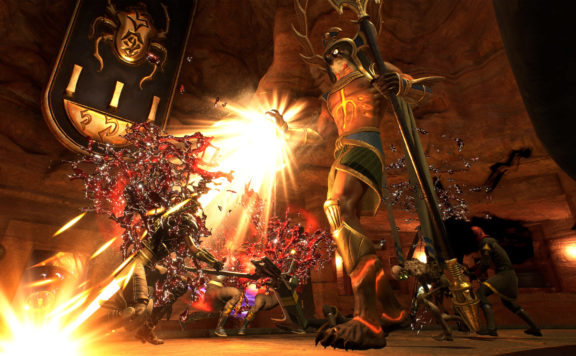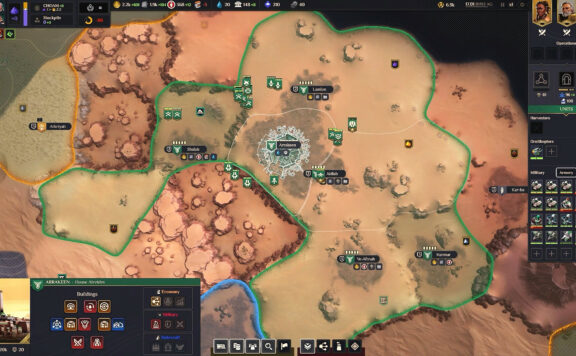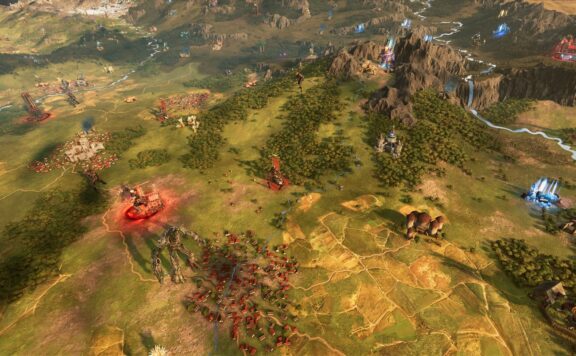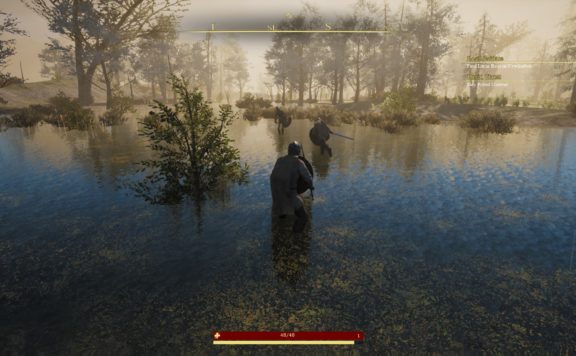French developer Shiro Games, known for such games as Evoland, Northgard and Darksburg, released a new 4X RTS title based on the universe of Frank Herbert. Titled Dune: Spice Wars, it invites players into battle for dominance and control over the desert planet of Arrakis and the spoils they may bring.
At first glance, the game resembles heavily redesigned but still clearly recognizable Northgard, in style, visuals and even in many in-game mechanics. The map consists of separate tiles connected by passages with the adjacent ones. It can be explored by scouts, as it happens in Northgard, with various resources scattered around in areas, with their own bonuses and disadvantages.
Let’s take a closer look.
Dune: Spice Wars is now available in Steam Early Access. The developers expect the game to remain in this stage for 9 to 12 months while the team updates and expands it with a new set of features, the full campaign, multiplayer and more – based on players’ feedback.
At the moment, the game features three maps, different in size but otherwise pretty similar to each other. However, they are more than enough for your first taste of the game. Playing on the biggest map against the medium difficulty AI took me roughly seven hours.
Players can choose between four factions, each featuring their own unique Generals which you can recruit two out of. Each character will provide you with special bonuses in-game. For example, my favorite Fremen general adds an extra open construction cell in the cities which significantly speeds up the development, especially in the early game. Every General brings their own bonuses and plays an important role in building a victorious strategy.
Both faction leaders and the Generals are characters from the original books – the fact that immediately drew me in. The developers have included a generous amount of lore into even the Early Access stage of the game, and I am very pleased with that.
As a huge fan of the universe that followed the books and other Dune-related games, I was charmed with this side of Dune: Spice Wars. Descriptions, quotes, appearances of troops and buildings – everything is screaming “DUNE” at you. Can it be that we’ll see Bene Gesserit sisters, Mentats and Guild Navigators? I certainly hope so.
When you start the game, you find yourself challenged by the AI. When you choose one of the 4 factions, it immediately makes the other 3 your opponents. Whether they will turn into full-blown enemies or not depends on your choice of strategy and tactics.
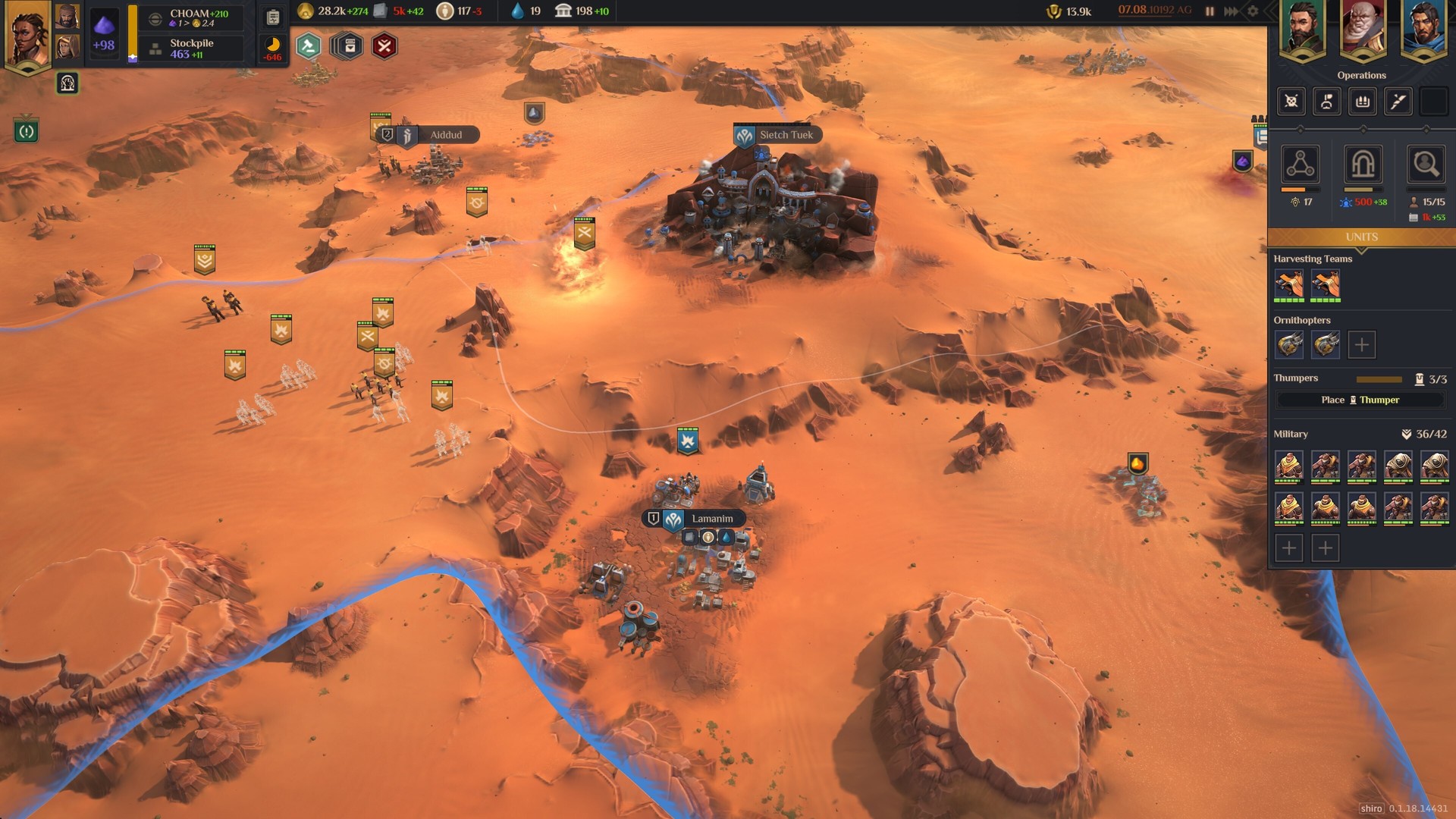
Every player starts with the main city, a large fortress or Sietch that functions as your main base. It will serve as your first center of operations, barracks to recruit soldiers and the source of Recon Ornithopters. You can start exploring the map with your Ornithopter right away and use the extremely helpful auto-reconnaissance mode that allows you to set them to scout and forget about their existence almost entirely. Enemies cannot attack them – vice versa, you cannot bring down enemy Ornithopters – but they can still get destroyed by dust storms. Another option is to set an Ornithopter to reveal hidden forces in the vicinity, which is also incredibly useful.
Recruiting your troops, capturing neutral cities rich with resources or just with a convenient location in a gorge will be your first task. However, each unit, each building, each settlement requires resources for maintenance. Troops use up command points and population, buildings eat up metal, towns and cities use points of influence and water and everything and anything requires special currency (Solaris).
Additionally, each faction has a unique currency only used by them. For example, everyone but Fremen use fuel but the faction pays for it with reduced mobility. All of these resources, currencies and parameters require a keen eye and proper monitoring.
Water extraction requires wind traps that are very reminiscent of the power plants from Dune 2 for Sega – which is an extra kudos from an old fan here. Getting more population requires recruitment centers, the collection of materials – processing plants, etc.
Separately, I want to mention the espionage and research points.
Each of the technology branches has a strong effect on productivity, troops’ firepower, the speed of research and espionage, construction and more. What branch to pursue is up to you, there are useful upgrades for all types of play. Getting research points is achieved through building research centers, negotiating and trading with free Sietchs (cities inhabited by Fremen), exploring old ruins scattered around the map.
Espionage points are awarded both overtime and based on various actions of players. They are spent on a variety of sneaky deeds: causing a riot in an opponent’s city, reducing the firepower of units, etc. There are special agents that can be sent to other factions’ bases to explore the planet/market or to counter-espionage. On higher difficulties, espionage turns into a real art: one wrong move or assignment or operation and half of your agents get caught and your overall espionage point production drops sharply. You are attacked from all sides, lose your Faction leader and that’s it.
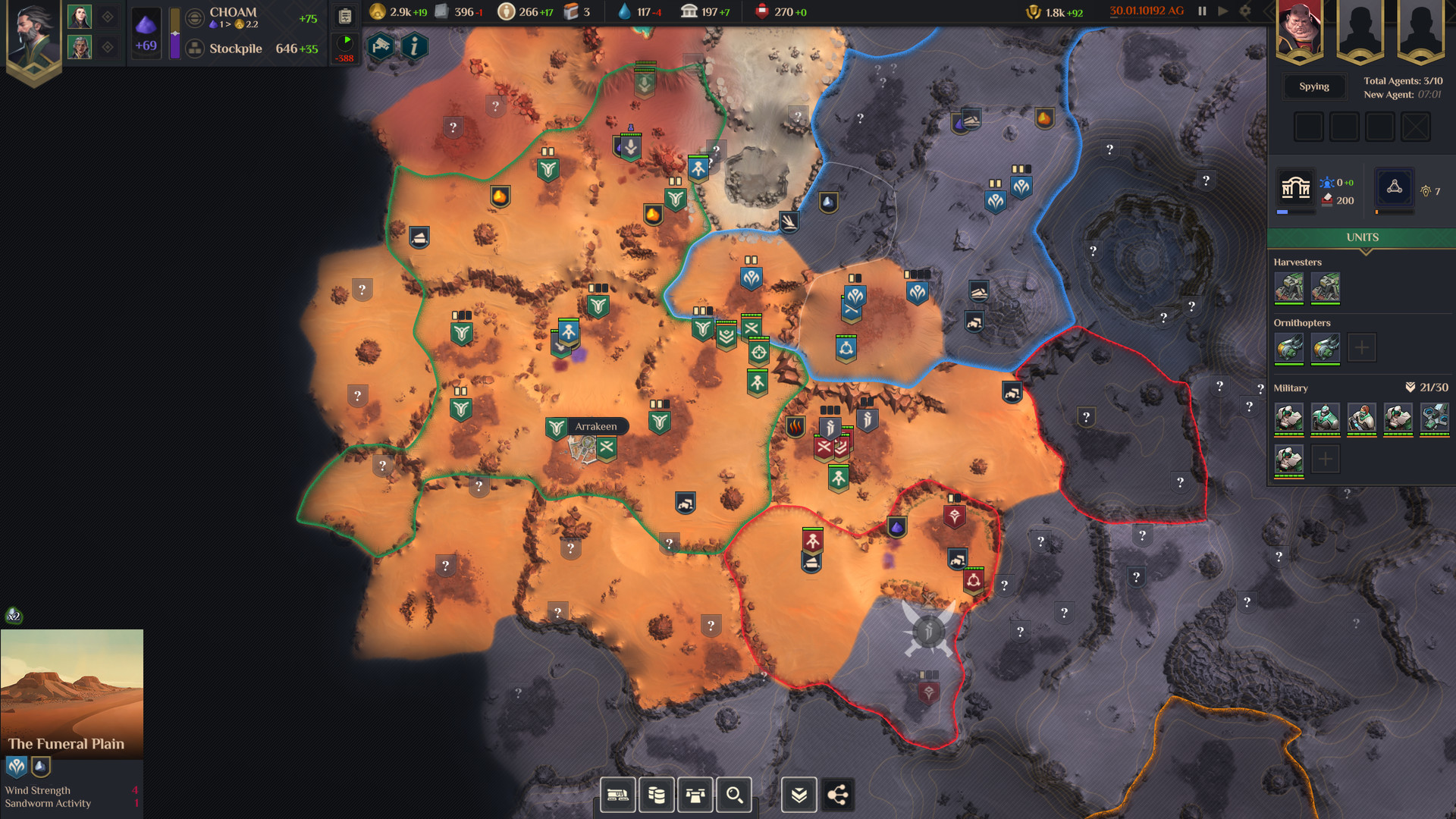
Last but not least, let’s talk about Spice extraction. As we all know, Spice Must Flow – a famous phrase that embodies the sword of Damocles the game is hanging over the factions. Spice is collected from you as a form of tax by the Space Guild and Landsraad (the supreme legislative body of the Empire). Also, by selling a part of extracted Melange (Spice) you can receive enough money/currency for hiring and maintaining just about anything and everything.
If you don’t manage to gather the required amount of Spice, you get hit with a punishment in the form of a decrease of Spice’s price on the market, reduced influence and so on.
However, if you manage to keep Spice flowing, as a Fremen you get a buff that increases the production of influence points needed to capture neutral cities and for other functions. Each faction has its own advantages. Harvesters of each faction but Fremen are constantly under attack by the worms and if you don’t pull back in time, there is a chance to lose them. Alternatively, there is a function of auto-recall in case of danger, but you pay for it with 5% of the produced Spice.
The main system of the game is the Economy, much like it was in Northgard. In a way, I even feel a bit bad about that, thinking back to the battles in old Dune titles with their uncomplicated economical sides. Now one extra unit can cost you dearly, forcing you to be vigilant, follow your units and plan your advancements with great precision.
Combat Sequences
The battles are fought by detachments of soldiers of different purposes, the construction and maintenance of each requiring several resources from you at once. Having too many forces might not be feasible economically. On the other hand, having a great army allows you to take out opponents rapidly.
You need an army to protect your own or to conquer an enemy territory, to take on the opponents’ troops, and to achieve complete and unconditional victory by destroying the enemies’ main House. The game currently features only infantry, and I found myself missing some tech – Harkonnen’s Devastators, Sonic Tanks of Atreides, etc.
Every city in the game, whether it belongs to you or the enemy or stays neutral, has its own limited cells for defending troops that need to be defeated in order to take over the city. You can skip building them altogether to save some cash but it will also make your cities easier to conquer.
Destroying the detachment that set out to attack you, protecting your cities, conquering enemies’ towns – there are a lot of things that need to be done and that you should keep track of. As well as the ubiquitous worm that is always in a hurry to eat your stomping troops.
Waging war in Dune: Spice Wars is extremely interesting but also expensive and time-consuming.
In order to win, you have to create buildings that increase the power of your troops, research the related technology, even build missile towers to protect your cities. Additionally, each faction has its own special features when it comes to units. For Harkonnens, standard fighters increase their strength by 50% when they lose health. Invisible Fremen, heavy infantry of the Harkonnen, light shooters of Atreides, each unit provides its own functionality. And applying it in the best way possible is almost an art.

Map & Visuals
At the moment, the map is a beautiful tapestry of small areas, each with its own landscape and features. Sometimes I would pause the game just to look at all the details of the scouted out areas – sandstorms engulfing cities, volcanoes, Sietch caves, ice cap, etc. Each element is drawn with love and looks extremely authentic.
Each faction has its own visuals, its own screens and even music. It’s a real pleasure to follow portraits of generals – Feyd-Rautha, Beast Rabban, Lady Jessica, Duncan Idaho and others. For the lovers of books, it’s like a balm applied straight to the soul.
The generals’ bonuses are selected taking into account their characters and preferences based on the books, which I want to thank the developers for. In general, all of the notes, interface elements, even Laansrad messages look authentic which is amazing. To me, it’s a HUGE plus – the developers have approached the source material with respect and love.
Summary
I can’t wait for the game’s full release and I’m extremely interested in the future campaign, the development of the history of Dune.
Out of the cons, personally for me the biggest one is the lack of technology and the game’s obsession with economy. Keeping track of everything at once becomes unbearable by mid-game. And, even though Dune: Spice Wars features a speed up function (extra kudos to Shiro for this one), it turns into a simulator of pause option to give orders.
Dozens of messages about being under attack, trade offers, hateful rhetoric from other factions bloat out the sun. While the economic model does fit the story of Dune – after all, the books cover politics, faith, genetics and, yes, economics of an entire Empire ran by Spice – upon hearing the word “Dune”, I first think of heavy battles with tech and infantry. Minimum economy, maximum tactics.
Shiro Games’ experience with Northgard left its own mark on Dune: Spice Wars – wildly beautiful and extremely complex in its economy, the game can provide many thrilling hours of gameplay. The team from Shiro Games developed ideas of Northgard further with the new title but Dune can still use more elements to set it apart from its predecessor. Be it heavy tech, PvP, further differences in gameplay between factions, etc.
Note: the Steam Early Access key was provided by the developers for the purposes of this preview.


